Go and C++: Programming in Two Successor Languages of C
University of California, Santa Cruz via Coursera Specialization
Overview
This specialization is intended for all programming and artificial intelligence enthusiasts who seek to master advanced skills like concurrency in Go and Standard Template Library use in C++. Through the four courses—two in C++, and two in Go—you will be exposed to key algorithms and search methods in artificial intelligence, some pioneered by the instructor.
Syllabus
Course 1: GO Programming for Everyone: Part 1
- Offered by University of California, Santa Cruz. This course introduces you to the GO programming language. It is appropriate for a ... Enroll for free.
Course 2: GO Programming for Everyone: Part 2
- Offered by University of California, Santa Cruz. This course provides you with new opportunities to use the Go programming language. ... Enroll for free.
Course 3: C++ For C Programmers, Part A
- Offered by University of California, Santa Cruz. This course is for experienced C programmers who want to program in C++. The examples and ... Enroll for free.
Course 4: C++ For C Programmers, Part B
- Offered by University of California, Santa Cruz. This course is for experienced C programmers who want to program in C++. The examples and ... Enroll for free.
- Offered by University of California, Santa Cruz. This course introduces you to the GO programming language. It is appropriate for a ... Enroll for free.
Course 2: GO Programming for Everyone: Part 2
- Offered by University of California, Santa Cruz. This course provides you with new opportunities to use the Go programming language. ... Enroll for free.
Course 3: C++ For C Programmers, Part A
- Offered by University of California, Santa Cruz. This course is for experienced C programmers who want to program in C++. The examples and ... Enroll for free.
Course 4: C++ For C Programmers, Part B
- Offered by University of California, Santa Cruz. This course is for experienced C programmers who want to program in C++. The examples and ... Enroll for free.
Courses
-
This course is for experienced C programmers who want to program in C++. The examples and exercises require a basic understanding of algorithms and object-oriented software.
-
This course is for experienced C programmers who want to program in C++. The examples and exercises require a basic understanding of algorithms and object-oriented software.
-
This course introduces you to the GO programming language. It is appropriate for a beginner, but especially for anyone who already knows C. GO is an open-source programming language developed and supported by Google. It is easy to learn and use. In the new world we live in, coding is a universally valuable skill, whether you're a scientist, artist, or a humanist. Algorithms are everywhere, and we all have to understand how they work. No prior knowledge of coding is needed for this course, but it helps if you have a background in C. The estimated time commitment for this course is five hours a week for five weeks. This is primarily aimed at first- and second-year undergraduates interested in engineering or science, along with high school students and professionals with an interest in programming.
-
This course provides you with new opportunities to use the Go programming language. Building on the foundational knowledge introduced in the first course "GO Programming for Everyone: Part 1", this course delves deeper into the Go programming language, offering a comprehensive understanding of its more advanced features. GO is an open-source programming language developed and supported by Google. It is easy to learn and use. In the new world we live in, coding is a universally valuable skill, whether you're a scientist, artist, or a humanist. Algorithms are everywhere, and we all have to understand how they work. Designed for learners who have completed the first course or possess basic Go programming knowledge, this course will expand your skills and enhance your ability to develop efficient, scalable applications. The estimated time commitment for this course is five hours a week for five weeks. This is primarily aimed at first- and second-year undergraduates interested in engineering or science, along with high school students and professionals with an interest in programming.
Taught by
Ira Pohl








